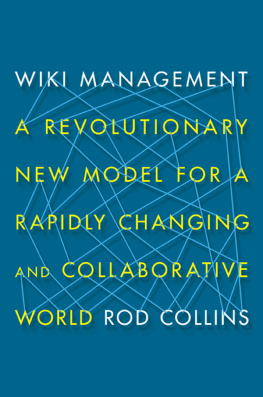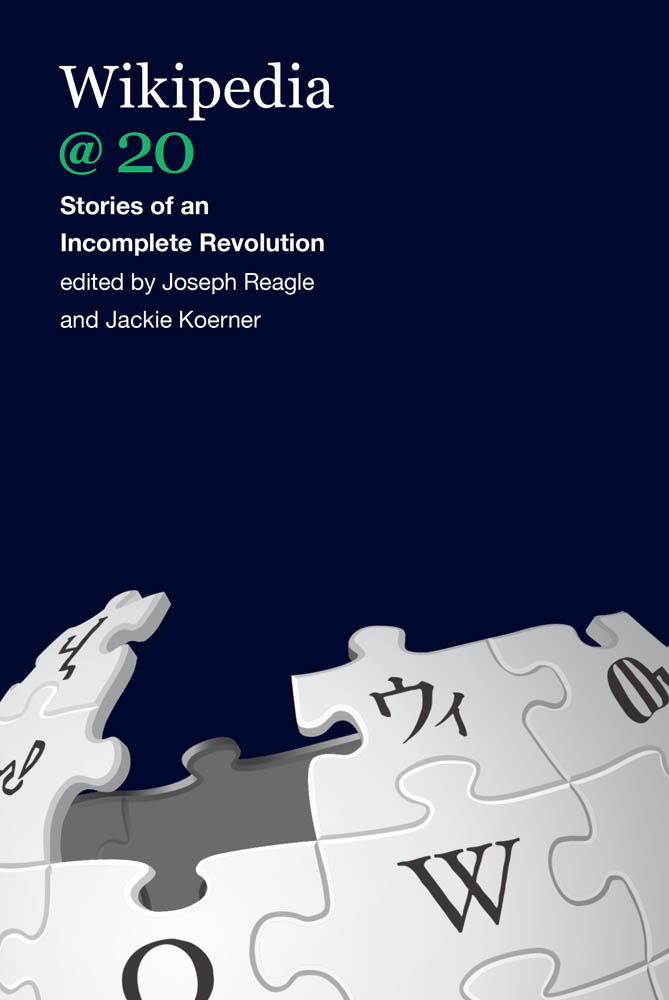This work is subject to a Creative Commons CC BY-NC 4.0 license.
Subject to such license, all rights are reserved.
The open access edition of this book was made possible by generous funding from Knowledge Unlatched, Northeastern University Communication Studies Department, and Wikimedia Foundation.
Names: Reagle, Joseph, editor. | Koerner, Jackie, editor.
Title: Wikipedia @ 20 : stories of an incomplete revolution / edited by Joseph M. Reagle and Jackie Koerner.
Description: Cambridge, Massachusetts : The MIT Press, [2020] | Includes bibliographical references and index.
Subjects: LCSH: Wikipedia--History.
Preface
This book was not an easy undertaking and is unusual in a number of ways.
Even though this is a collection of essays from an academic press, our contributors are not exclusively academics. Many of the essayists make use of Wikipedia as part of their work: scholars, teachers, librarians, journalists, and activists. Many are more than one of these things. Many of the essayists are also multilingual, and not all are writing in their native language. This variety is a strength, speaking to the connections among languages, professions, and enthusiasms across the movement.
Also, we hope to reach a general audience. Our intention is to speak to the nonspecialist reader interested in Wikipedia. Perhaps our readers are fond of using Wikipedia, or perhaps they follow stories about it with interest. Perhaps they even contribute to Wikipedia, a little or a lot. Or, perhaps, Wikipedia is part of their work. This isnt an introduction to Wikipedia; rather, it is a set of reflections from those who have given a lot of thought to the online encyclopedia as its twentieth year approaches.
The process for this book was also unusual. With the approach of Wikipedias anniversary, we aspired to move quickly and create an accessible and coherent work. Gita Devi Manaktala, MIT Presss editorial director, suggested we make use of PubPub, a new online collaborative publishing platform. Each essay began as a proposed abstract; those selected were given editorial feedback. Later, full drafts were posted on PubPub and open to peer, public, and editorial review. Finally, revised essays underwent external review before selections were made for the printed book.
Completing such a work requires the generosity and patience of manyespecially when theres a change of editorship midstream.
Skill and patience could not be better exemplified than by Gita Devi Manaktala, Maria Isela Garcia, and Jessica Lipton at MIT Press. Their editorial and logistical savvy was paramount to this projects completion. Other consummate professionals who contributed to the polish, production, and presentation of this work include Elizabeth Granda, Marcy Ross, Kate Elwell, Gregory Hyman, Matthew White, Ori Kometani, and Susan Clark.
This book is the result of a collective effort. Unfortunately, we could not include all of the pieces here, and the website remains a broader and useful hypertextual collection from all those who participated. John Broughton, Stephane Coillet-Matillon, Jake Orlowitz, and Denny Vrandei were especially generous with their feedback on PubPub. The editors benefited from the guidance and expertise of Phoebe Ayers, Siko Bouterse, Anasuya Sengupta, and Adele Vrana. Samantha Lien and Nadee Gunasena from the Wikimedia Foundation helped to facilitate the capstone piece. And the external reviewers for MIT Press went above and beyond by providing helpful feedback on a large manuscript in a short period of time. Thank you to all.
Like any technology, a publishing platform can prompt moments of confusion. PubPubs Catherine Ahearn, Gabe Stein, and Travis Rich were quick to respond to the many questions we sent their way.
The open access edition of this book was made possible with generous funding from Knowledge Unlatched, the Northeastern University Communication Studies Department, and a Wikimedia Foundation rapid grant.
We hope you will enjoy this unusual collection. It was produced in the wiki-spirit of open collaboration, contains varied voices, and speaks to insights from hindsight and visions for the future. What might you learn in reading these pages? Though Wikipedia was revolutionary twenty years ago, it has yet to become the revolution we need. The important work of sharing knowledge, connecting people, and bridging cultures continues.
Introduction: Connections
Joseph Reagle and Jackie Koerner
Twenty years ago, Wikipedia set out on its path to provide humanity with free access to the sum of all knowledge. Even if this is a mission that cant be finished, Wikipedia has made remarkable progress toward the impossible. How so? Wikipedia is an encyclopedia built on a wiki. And never has an application (gathering the sum of human knowledge) been so suited to its medium (easily interconnected web pages).
Encyclopedias have long been reliant on interconnections. In 1755, the Encyclopdies Denis Diderot wrote that the use of cross-references (or renvois) was the most important part of our encyclopedia scheme. This feature allowed the Encyclopdies editors to depict the connective tissue of Enlightenment knowledge and to dodge state and church authorities by way of facetious and satirical references. For example, they linked to articles on the Christian rite of communion, wherein the body and blood of Christ is consumed, from the article on Cannibals.


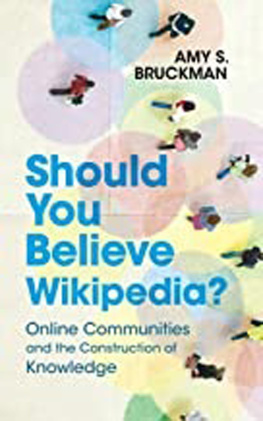

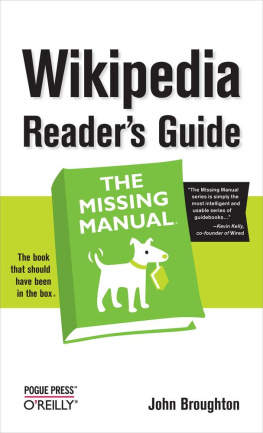
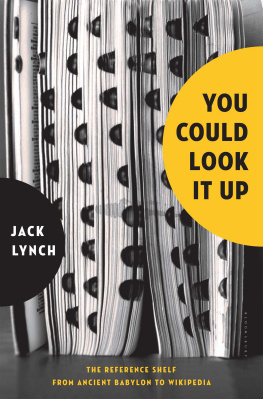
![Conor Lastowka - [Citation Needed]: The Best of Wikipedias Worst Writing](/uploads/posts/book/53705/thumbs/conor-lastowka-citation-needed-the-best-of.jpg)
